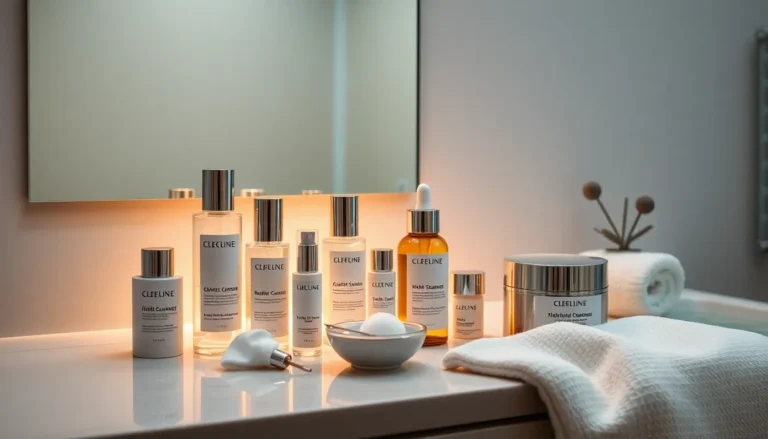Table of Contents
ToggleIn a world where flawless skin seems as elusive as a unicorn, the quest for an effective skincare routine can feel like a never-ending saga. But fear not! With a little guidance, anyone can transform their complexion from “meh” to magnificent. Think of it as a recipe for success—mix a dash of cleansing, a splash of hydration, and a sprinkle of sun protection, and voilà! You’ve got the perfect potion for glowing skin.
Understanding Effective Skincare Routine
Implementing an effective skincare routine is essential for achieving and maintaining healthy skin. Knowledge of the best practices can transform the complexion and promote confidence.
Importance of Skincare
Skincare plays a crucial role in overall health. It protects skin from environmental stressors like pollution and UV rays. Adopting a regular routine helps to prevent issues such as acne, aging, and dryness. Healthy skin aids in regulating body temperature and retaining moisture. Consistent skincare fosters a glowing appearance that can boost self-esteem. Prioritizing a daily regimen leads to long-term benefits, enhancing both skin texture and tone.
Key Components of a Skincare Routine
An effective skincare routine consists of several key components. Cleansing removes dirt and impurities, keeping pores clear. Exfoliation promotes cell turnover, revealing fresh skin underneath. Hydration is vital for maintaining moisture balance; products with hyaluronic acid can enhance this effect. Sun protection becomes essential during the day to shield skin from harmful UV rays. Selecting suitable products tailored to individual skin types improves results. Regularly assessing and refining the routine ensures optimal skin health over time.
Steps to Build an Effective Skincare Routine

Creating an effective skincare routine involves several key steps that enhance skin health. Focusing on cleansing, exfoliating, toning, moisturizing, and sun protection ensures comprehensive care.
Cleansing
Cleansing removes dirt, oil, and makeup from the skin. An effective cleanser suits individual skin types, whether oily, dry, or combination. Use a gentle formula twice daily for best results. Rinsing with lukewarm water helps maintain skin’s natural barrier. A well-cleansed face prepares the skin for subsequent products, maximizing their efficacy.
Exfoliating
Exfoliating eliminates dead skin cells, promoting cell turnover. Gentle chemical exfoliants, like AHAs and BHAs, offer effective options for various skin types. Using these products 1-3 times a week prevents buildup and keeps skin looking fresh. Choosing the right exfoliator can reduce the risk of irritation, especially for sensitive skin. Healthy skin requires balance, so moderation is key in this step.
Toning
Toning helps restore skin pH and tighten pores. Alcohol-free toners are ideal for hydration, while those with soothing ingredients enhance comfort. A toner can prime the skin for serums and moisturizers, improving product absorption. Incorporating toning into the routine increases overall skin brightness and smoothness. Finding a toner that meets specific skin needs creates an additional layer of care.
Moisturizing
Moisturizing prevents dryness and supports skin barrier functions. Selecting a moisturizer based on skin type ensures adequate hydration. Lightweight gel formulas cater to oily skin, while creams benefit dry skin. Applying moisturizer after other products locks in moisture and smooths skin texture. Daily use keeps skin healthy and nourished, providing a hydrated appearance.
Sun Protection
Sun protection is crucial for preventing premature aging and skin cancer. Broad-spectrum sunscreen with an SPF of at least 30 protects against UVA and UVB rays. Applying sunscreen daily, even on cloudy days, combats harmful effects of sun exposure. Reapplying every two hours during outdoor activities enhances skin safety. Prioritizing sun protection plays a significant role in maintaining youthful, vibrant skin.
Tips for an Effective Skincare Routine
Building an effective skincare routine requires careful consideration of product selection and suitability to one’s skin type. Choosing effective products forms the foundation for healthier skin.
Choosing the Right Products
Selecting skincare products necessitates attention to ingredient lists and formulation. Look for products with beneficial ingredients like hyaluronic acid for hydration, salicylic acid for acne, or niacinamide for redness reduction. For those with sensitive skin, fragrance-free options minimize irritation. Always perform a patch test prior to widespread application to gauge reactions. Reviewing dermatologist recommendations can also aid in making informed choices. Prioritize efficacy over brand loyalty, ensuring the selected items support an individual’s skincare goals.
Adapting to Skin Type
Finding the appropriate products hinges largely on understanding skin type. Oily skin benefits from lightweight, oil-free formulas to reduce shine while maintaining hydration. Dry skin requires richer creams or lotions that trap moisture effectively. Combination skin calls for targeted treatments in specific areas, such as gel-based moisturizers in the T-zone. Normal skin may handle a broader range of products but still needs routine adjustments based on seasonal changes. Regular assessments promote an adaptable routine, addressing evolving needs and ensuring optimal skin health.
Common Mistakes to Avoid
Avoid skipping sunscreen daily. Neglecting sun protection can lead to premature aging and skin cancer. Not cleaning skin thoroughly can cause pores to clog, resulting in breakouts. Exfoliating too frequently irritates skin instead of promoting a healthy glow.
Choosing products without considering skin type often leads to adverse reactions. It’s essential to opt for moisturizers that cater specifically to individual needs, as using the wrong formula can exacerbate dryness or oiliness. Relying solely on makeup to mask imperfections fails to address underlying skin issues.
Using too many products at once complicates the routine and increases the risk of irritation. Focusing on a few high-quality items is more beneficial. Forgetting to read ingredient labels can result in allergic reactions or sensitivity, making it vital to steer clear of potentially harmful substances.
Failing to patch-test new formulations often leads to unforeseen irritation. Incorporating a new product gradually into the routine allows for monitoring any adverse reactions. Disregarding signs from the skin, such as redness or breakouts, typically results in worsened conditions.
Overnight success expectations can lead to disappointment. Skincare benefits take time; consistency remains crucial for attaining desired results. Skipping regular assessments of the routine also hampers progress. Revisiting and adjusting routines as skin changes ensures continued efficacy.
An effective skincare routine is essential for achieving and maintaining healthy skin. By incorporating the right steps and products tailored to individual needs, anyone can enhance their complexion and protect against environmental stressors. Consistency and patience play crucial roles in seeing results.
Regularly assessing and refining the routine ensures it adapts to changing skin conditions. Avoiding common pitfalls like over-exfoliating and neglecting sunscreen can make a significant difference in skin health. Ultimately, investing time in a personalized skincare routine not only improves appearance but also boosts confidence and overall well-being. Embrace the journey to glowing skin and enjoy the benefits that come with it.




